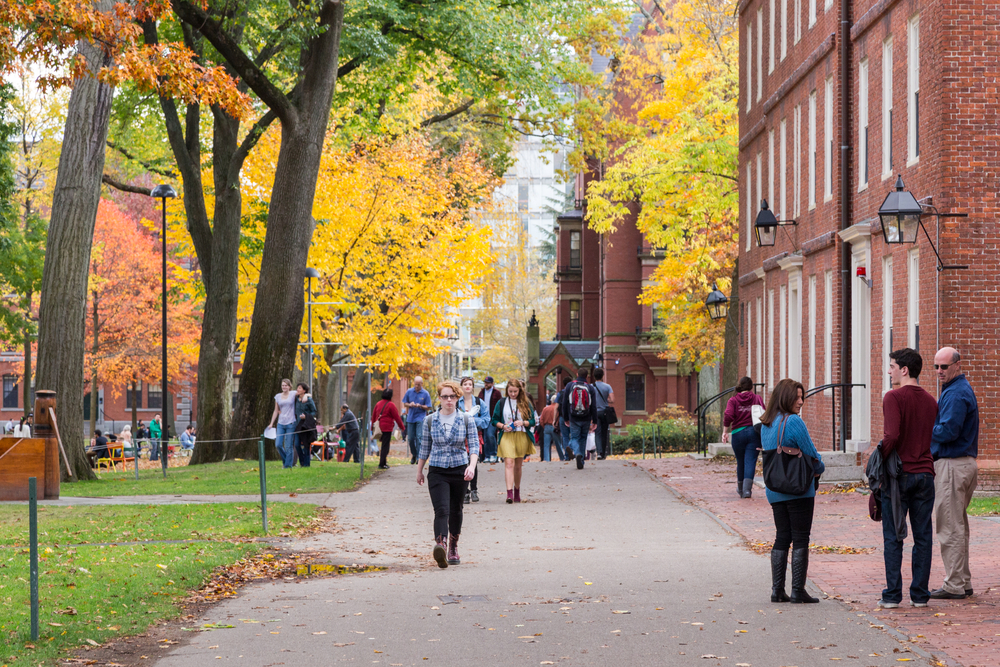Is college worth it?
This has been the question for the past few years, especially in the wake of dropping enrollment. This drop has largely been a response to many college campuses going fully online and imposing a wide slew of mandates and prohibitions in response to the COVID pandemic. No longer were students getting “the college experience” of having esoteric discussions in class during the day and partying at night. Instead, they were confined to their dorms, forced to take a COVID test each week, and left to make the best of it with online learning. Needless to say, many students saw little reason to pay tens of thousands of dollars for an experience that amounted to house arrest combined with Khan Academy.
As colleges began relaxing their rules and returning to pre-COVID normalcy, the burning question of college’s worth started to cool down, that is until President Biden announced a sweeping executive order that would pay off so many graduates’ outstanding college debt. Besides the serious objections to its legality, this move would easily amount to billions of dollars of spending for a class of people with relatively good financial prospects. Moreover, it’s deeply unfair to people who have already paid off their college loans or who never took out college loans because they never attended college. In return for being responsible and living up to their contractual obligations, or not assuming loan debt in the first place, they will now have to pay for those who did the opposite.
Of course, if Biden and his supporters feel there’s a need to help college graduates pay off their debt, this prompts the question: Is college really worth it? After all, if it is, then there’s no need to spend billions of dollars to bail out the recipients of such a great benefit. If college really equips young adults with the intellectual tools to succeed in society, then these students should have no problem making a life for themselves afterward.
Predictably, the great debate over the value of a college degree has now become a partisan issue. Most on the left will continue to champion college as a necessity both for society and individuals. They will argue that college helps young adults find themselves, develop thoughtful positions on issues, and prepare for a career in the modern “knowledge” economy. In line with this view, many of them have embraced the campaign promise of Sen. Bernie Sanders and believe that government should pay for all citizens’ college education. For all this, though, it’s rare that anyone on the left actually explains what exactly college is supposed to do (i.e., train students how to think, not what to think).
On the right, however, there has been a decided turn against college. Many conservative commentators routinely lambast universities as brainwashing factories, turning otherwise well-adjusted adolescents into leftist radicals sporting Che Guevara T-shirts and establishing autonomous zones in progressive urban centers. They will point and laugh at the unattractive snowflakes triggered by microaggressions and make-believe fascists. Yet, when faced with the question of how the majority of non-woke students will make it in today’s world without a college degree, they carelessly reply, “They can learn a trade.”
It so happens that in the midst of this debate two former academics have come out with a book that analyzes the current state of universities in more depth than the usual treatment from either right or left. In Don’t Go to College: A Case for Revolution, Michael J. Robillard and Timothy J. Gordon not only cover the familiar problems plaguing colleges but also perceive something deeper corrupting an institution that was so fundamental to Western civilization. The real problem is more than the financial cost, the coddling, or even the abuse the writers themselves suffered—it’s the philosophy stupid.
Originally, college was supposed to teach students how to think. Robillard and Gordon highlight the contrast of students in the past being taught “to understand the world” and students today “changing the world” well before they know anything about it. In the past, when understanding was the goal, students were taught to make proper definitions of things, to understand their nature, and to form logical conclusions. In other words, they learned philosophy, and not just any postmodern nonsense that passes for philosophy these days, but “the ‘perennial’ philosophy of Aristotle and Saint Thomas Aquinas” that articulated the principles of natural law. For the writers (both of whom are well trained in philosophy), those main principles are (1) “Man, unlike other animals, bears free will to make moral decisions,” (2) “nature is intelligible,” and (3) “nature has a purpose and a goal.” These ideas animate the university and inform all the disciplines in it.
When Thomism—or, more commonly, the Scholastic tradition that grows out of Thomism and propounds the theory of natural law—ceases to be the predominating philosophy of a university, the university simply ceases to be. This is easy to see in the way courses are taught, many of which have adopted a “neo-Marxist” philosophy: “Thomism is meant to advance actual knowledge, neo-Marxism is meant to advance propaganda, which is true to Marx’s goal of putting change (revolution) above understanding (wisdom).” Whereas one philosophical system espouses the intellect and reason, the other system emphasizes feeling and action. It’s no mystery which one is the easier sell to young adults.
But ideas have consequences, and the damage done by the capture of neo-Marxism cannot be underestimated. It has fundamentally warped the whole goal of college. According to Robillard and Gordon, students who are now charged with “changing the world” have taken this to mean “changing mankind,” which explains the current rush to embrace transhumanism. Citing more than a few authorities on this topic, the writers explain:
transhumanists believe that human beings are reducible to data points; technology can deliver secular utopia; tech gurus should lead society (and globalist technocrats manage it); and depopulation, anti-natalism, extreme life extension, vegetarianism/veganism, alternative sexual lifestyles, New Age spiritualism (but not Christianity), wokeism, and new urbanist/“smart-city” living are all unquestionably good things.
Noticeably missing in transhumanism is the belief in freedom, virtue, the mind, the hard sciences, or even life itself. Rather, there’s a passive faith in progress and an unfounded optimism in mass dehumanization. So long as no one stands in the way and makes demands on individuals to live and act independently, and all people agree to this vision of the world, utopia will be just around the corner.
Perhaps the silver lining in this dark cloud of neo-Marxism is the incompetence of those who ascribe to it. In the majority of cases, the products of such an education are overgrown children with little capacity to change anything. At best, they can plug themselves into a system and submit to the oligarchs who run it. As for exercising the powers of an educated adult—one who owns property, has a family, cultivates intellectual self-reliance—they will falter. In a chapter provocatively titled “Adult Day Care: Why College Will Retard Your Maturity,” Robillard and Gordon assert that “mass-manufactured collegians have given us a society where young graduates join the workforce and run around cities and suburbs thinking like self-obsessed adolescents, yet aping many of the purposive movements of busy grown-ups who head families.”
Immature and ignorant yet thoroughly catechized in neo-Marxism, many college students will assert themselves in the most limited of ways, pushing for a woke culture and targeting the precious few conservatives who fight the good fight. Both writers have been on the receiving end of this intolerance, though Gordon had it much worse. While Robillard saw the disintegration of the academy happening around him and jumped ship, Gordon, the father of many children, including one with special needs, was terminated from his position as the theology department chairman “for speaking out publicly against the domestic terrorism taking over American cities.” If anyone wonders how pushing these two brilliant men out of the academy made it better, they’re asking the wrong question. What matters is that it felt good for the people doing the pushing.
In response to this insanity, Robillard and Gordon propose two courses of action. First is to follow the advice of the book’s title and not go to college. In place of this, they offer some guidance on becoming an autodidact in the liberal arts. As one might expect, it all starts with philosophy: “Indeed, every aspect of our lives that involves thinking plunges us into philosophy, and every academic subject has a philosophical basis.”
It’s clear in the time and attention they give to this topic that it’s their passion. However, their enthusiasm for Plato, Aristotle, and St. Thomas occasionally makes them unrealistic in their advice. True, a person can pick up a copy of the Republic or Nicomachean Ethics or a 600-page summary of the Summa Theologica and try to read it cold, but it’s unlikely they’d make it past the first few pages. (Personally, I recommend reading Mortimer Adler’s How to Read a Book before taking such a plunge.)
The second recommended course of action is to become a troll on campus, challenging professors and constantly making a fuss about woke absurdity. It’s difficult to tell if the writers—I’m going to assume it’s the churlish former punk-rocker Gordon taking the lead here—are being serious or merely suggesting just how futile it would be to try and pull off the same stunts leftist students and professors do. Either way, the suggestions to “angrily demand that [the professor] call you ‘European American’” or to “get no fewer than two of your most anti-Christian, anti-morality, anti-white, anti-American professors fired” are foolhardy at best and life-ruining at worst. Even Aristotle and St. Thomas would take issue with such advice.
Despite this relatively minor misstep, once all is said and done, Robillard and Gordon indeed make a solid case against what college has become—expensive, stupid, and utterly unhinged. Having done my fair share of college studies—and even having had the same wonderful philosophy professor as Tim Gordon—I can attest to most of the criticisms they make. Like them, I can’t completely discount what I’ve learned, but as they also recommend, so much of my learning happened outside school, when I forced myself to read the Classics and focus on philosophy.
More importantly, Robillard and Gordon make a great case for the liberal arts in general. In criticizing the many faults of modern-day colleges, they explain how a bad education and bad philosophy ultimately lead to an unfulfilling, impotent kind of life. It’s no surprise that our society has decayed politically and culturally; this is the inevitable result of its having rejected the West’s, and western education’s, founding principles. While we can lay much of the blame at the feet of today’s colleges, it’s critical that we either restore the university from the ground up or design a plausible alternative, one that’s unafraid to recover the great books of the past and that can assist and inspire us in our lifelong pursuit of wisdom.

